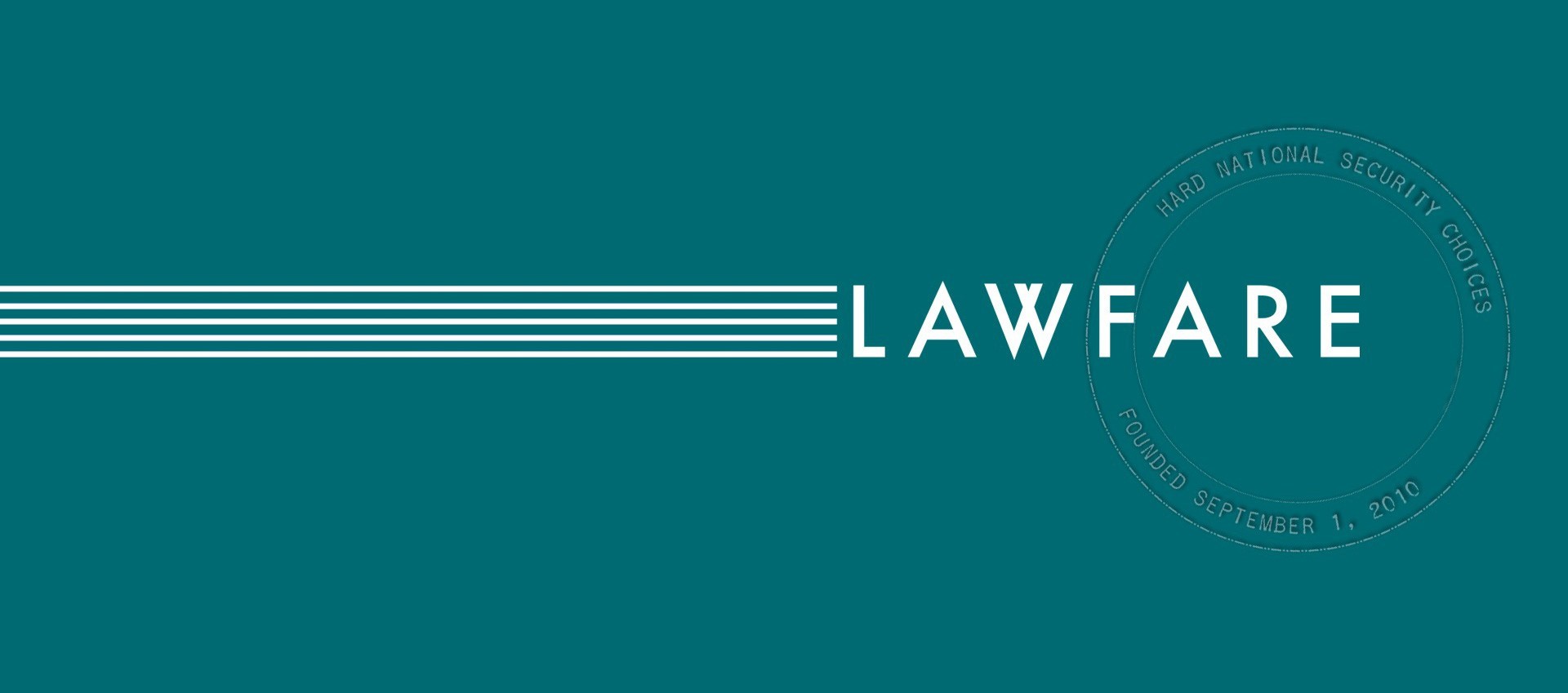The Week That Was: All of Lawfare in One Post
After VICE News published a mammoth 11,000 word piece on Saturday afternoon claiming Edward Snowden repeatedly sought to file his surveillance concerns with the NSA before he became a household name for leaking classified information, Carrie Cordero swiftly undercut the hype around the piece that same night.
Published by The Lawfare Institute
in Cooperation With

After VICE News published a mammoth 11,000 word piece on Saturday afternoon claiming Edward Snowden repeatedly sought to file his surveillance concerns with the NSA before he became a household name for leaking classified information, Carrie Cordero swiftly undercut the hype around the piece that same night. On Thursday, after analyzing the 800 NSA documents released as part of VICE’s FOIA request, Susan Hennessey went one step further by concluding “that the entire narrative arc of the [VICE] story is wrong.”
Jack Goldsmith reminded us that time flies and it’s been three years since the Guardian published its first story based on the trove of documents Snowden supplied. Jack reflected on how Snowden’s revelations — which former attorney general Eric Holder praised last week as a “public service” — inadvertently strengthened and entrenched some of the intelligence community’s very practices that Snowden sought to dismantle while also forcing the agency to consider the benefits of greater transparency.
Perhaps seizing on the spate of good publicity that Snowden has received courtesy of Eric Holder and VICE in recent days, Paul Rosenzweig asked Snowden—tongue firmly in cheek—whether he knew any would-be whistleblowers at the IRS who could disclose Donald Trump’s true net worth for the world to know. Paul also submitted a more serious request on Saturday when he asked whether any law school students would be interested in working with him on a project exploring the limits of presidential authority in the sphere of national security.
Ben Wittes connected Donald Trump’s guarantee in an interview with CBS’s John Dickerson that he would prosecute Secretary Hillary Clinton with an earlier post he wrote warning how a determined president could wield the Department of Justice as a political weapon. He also published Part II of his series on Trump and the Powers of the American Presidency, in which he warns that the inherent and necessary virtues of the executive branch can be viewed as fatal flaws if undeserving leaders are elected.
Unsurprisingly, Ben and Paul aren’t the only men in the United States who have grown uneasy in this political climate. Ben penned advice for career public servants in the national security community who are apprehensive that the next administration may willfully disregard legal, political, and ethical checks.
Lawfare reported on the ongoing military commission case for the alleged masterminds of the 9/11 attacks. Zoe Bedell covered the May 31st hearing, while Francesca Procaccini detailed the pre-trial proceedings for June 1st and 2nd. Helen Murrillo closed Lawfare’s coverage for the week after tracking the June 3rd session.
Chris Meserole called for data analytics and empirical evidence to play greater roles in not just improving the execution of existing policies but also determining the decisions policymakers make at the highest levels.
Washington’s general reluctance to incorporate data analysis into the policymaking process may be one of the reasons Amy Zegart argued that the cultural gap between Washington and Silicon Valley is already stark and deteriorating.
Dave Aitel suggested that issuing "cyber letters of marque" is a cybersecurity solution that can scale, one that deserves an examination of how constitutional principles can be adapted to the cyber age.
The resignation of Israeli Defense Minister Moshe Yaalon and his subsequent replacement by Avigdor Lieberman rocked Israeli politics. Yishai Schwartz stepped back from the cacophony to examine Yaalon’s resignation and its implications for the Israel Defense Forces as a moral institution in Israeli society.
But while the IDF is conducting an ongoing report into its actions during the 2014 Gaza hostilities, David Bosco drew our attention to a lengthy Human Rights Watch article urging the International Criminal Court to launch its own investigation of the situation in Palestine.
Doron Hindin warned that the recent U.N. Human Rights council resolution discouraging commercial engagements with Israel is a step towards dismantling the legal architecture of free trade on the basis of political considerations.
Naming the participants at a seder dinner hosted by Israeli Ambassador to the United States Ron Dermer may sound like the start of a bad joke, but that’s exactly what the Israeli Supreme Court ordered Israel’s Foreign Ministry to disclose on Monday. Elena Chachko delved into why that matters and what implications it holds for Israel’s Freedom of Information Law.
Tensions are rising in the Asia-Pacific as the Philippines and China wait for an impending United Nations tribunal verdict on the two countries’ maritime dispute in the South China Sea. Julian Ku dismissed China’s assertion that it is under no obligation to comply with the forthcoming verdict as legally unsupportable.
France is also following these legal developments closely to the surprise of many. Thankfully, David Bosco contextualized recent reports of France’s newfound interest in the South China Seas.
Kenneth Propp flagged two cases that the European Court of Justice will hear this fall as of importance for U.S. law enforcement. While neither case involves the United States, their rulings may clarify how law enforcement agencies can handle bulk data.
Kemal Kirişci called on the international community to collaborate with Turkey in resolving the Syrian refugee crisis, six years after the tragedy began.
Laura Dean brought us the latest Syria Displaced dispatch from Paris, discussing refugee integration and existing Franco-Arab communities.
David Bosco brought the concerns of Serge Brammertz, the chief prosecutor for the International Criminal Tribunal for the former Yugoslavia, to our attention. Brammertz fears that the region’s contempt for the ICTY is growing.
Back in the United States, Nora Ellingsen reported on three trials where would-be ISIS and AQAP fighters have been prosecuted in federal district courts.
This week’s Lawfare Podcast featured a May 31st discussion between a number of arms control and Middle East experts — moderated by Brookings Senior Fellow Suzanne Maloney — on the likelihood that regional powers would pursue their own nuclear programs in the wake of the Iran Deal. The discussion coincided with the publication of a new report by Brookings Senior Fellows Richard Einhorn and Richard Nephew that grapple with the same question.
In Rational Security, the gang covered the 2016 presidential election and Hillary Clinton’s speech lambasting Trump as ineligible for the job of Commander-in-Chief.
Later in the week, Cody Poplin flagged the House Republican's 2016 national security strategy, noting its marked departures with the policy proposals of Donald J. Trump.
Jack and Ben extended an invitation to Lawfare readers to attend the June 15th Hoover Book Soiree, where Ben will interview Fred Kaplan about his new book, Dark Territory: The Secret History of Cyber War.
In the most recent edition of the Steptoe Cyberlaw Podcast, Kevin Kelly sat down with Stewart Baker to discuss emerging technology trends. They also award the Dumbest Journalism Award of 2016 to…yup, you guessed it, VICE for their 11,000 story on Snowden. Talk about bookends for this post.
And that was the week that was.





